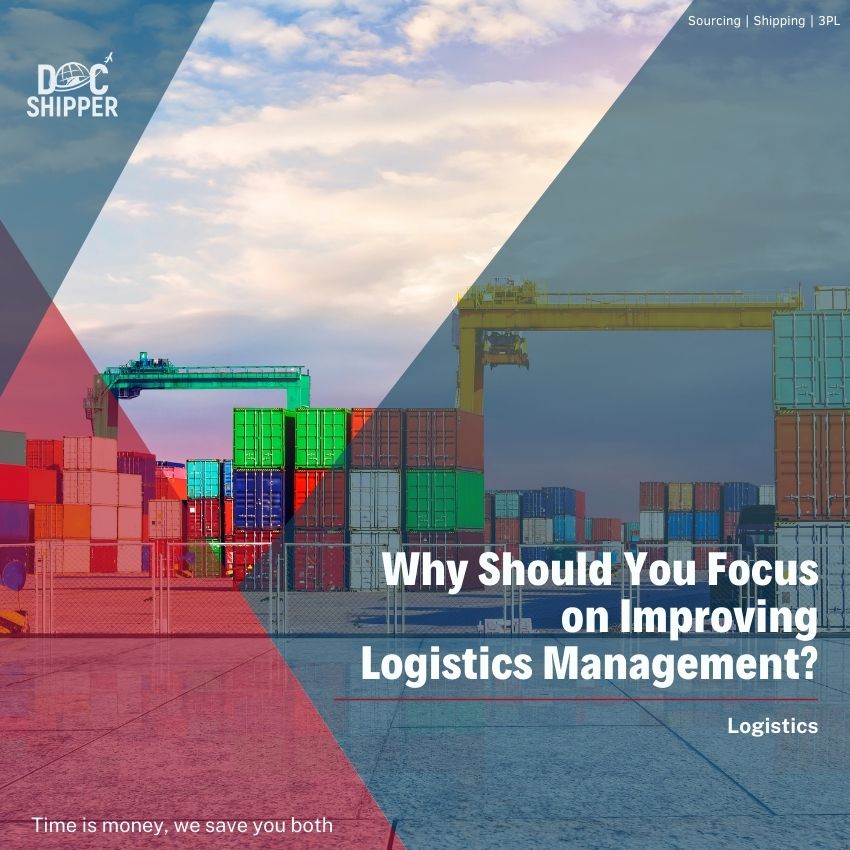As we step into 2025, the logistics and supply chain landscape continues to evolve at an unprecedented pace. The convergence of technology, AI, sustainability, and shifting consumer behaviors is reshaping the way businesses operate both daily and strategically.
Given these rapid changes, understanding the emerging logistics trends is essential for companies striving to remain competitive and adaptable in a constantly evolving environment.
As your trusted logistics and supply chain ally, the experts at DocShipper are here to guide you through this article, highlighting the most significant supply chain and logistics trends that will shape 2025 and beyond. Let’s dive in!
Key supply chain and logistics Trends that will shape 2025

As we enter 2025, the logistics landscape is poised for significant transformation, driven by emerging trends that will redefine how businesses operate. So, we understand that adapting to these changes is essential for your success, and we are excited to explore the pivotal logistics trends that will shape the future of supply chain and logistic undustry this year but also in the upcoming years.
1. Digital Transformation
The shipping and logistics sector is undergoing a significant digital transformation. Advanced analytics, artificial intelligence (AI), and machine learning are becoming integral pillars to supply chain operations.
For instance, now more than ever companies must learn how to leverage these technologies to enhance decision-making, optimize routes, and improve inventory management among many other operations. For example data integration across multi-platforms allows for real-time visibility, enabling businesses to respond swiftly to market changes and customer ever-changing demands.
Digital transformation will continue to be a driving force in logistics trends throughout 2025, shaping how businesses adapt and thrive in an evolving landscape.
2. Artificial Intelligence Innovations

One of the biggest emerging trends in logistics during the last years is AI . AI continues to revolutionize logistics but also the supply chain industry in several ways.
Hence, here are some of its impacts on the supply chain and logistics process:
-
Computer Vision
This technology enhances inventory management by enabling automated tracking and monitoring of goods throughout the supply chain. Computer vision, along with other AI technologies, has emerged as a crucial trend in transportation and logistics over the past few years.
Example 1 : IBM leveraged computer vision technology to develop "My Moments" for the 2018 Masters golf tournament, processing extensive footage to pinpoint key shots and create customized highlight reels for viewers.
Example 2 : Google Translate enables users to aim their smartphone camera at signs written in foreign languages, providing instant translations in their chosen language.
-
Audio AI
Audio AI refers to the application of AI algorithms to create, modify, or improve audio experiences, ensuring that they sound natural. Hence, Predictive maintenance powered by audio AI helps in identifying equipment issues before they lead to costly downtime , delays and other timing issues related to shipping or prodcuts delivery. By ensuring smoother operations and timely responses, audio AI significantly enhances overall efficiency.
Example 1 : Gatik: Implements audio AI in autonomous delivery vehicles to monitor environmental sounds and improve its navigation and safety during deliveries.
Example 2 : LogiNext: Uses audio AI to enhance communication within logistics teams, providing real-time updates and alerts through voice-activated systems.
DocShipper Advice : As a leader in integrating AI technologies, data science, and growth hacking in logistics, DocShipper is here to help you navigate the latest trends and innovations with ease. Feeling overwhelmed by the rapid pace of technology? Contact our experts today, and let us guide you through the future of supply chain management in 2025!
-
Generative AI

Who among us hasn’t heard about generative AI in 2024? This innovation known as one of the biggest logsitics trends since 2024 can help us automate content creation and customer service interactions.It aims to improve efficiency and maximize customer satisfaction.
Example 1 : Walmart leverages generative AI to optimize inventory management by analyzing over 850 million product data points. This technology helps forecast stock needs accurately ,ensure shelves are well-stocked while minimizing excess inventory.
Example 2 : UPS employs generative AI for predictive maintenance and dynamic route optimization. This allows them to adjust delivery routes in real-time based on traffic and weather, enhancing efficiency and ensuring timely deliveries.
-
AI Ethics

As AI becomes more prevalent, addressing privacy concerns and ethical implications will be critical for maintaining trust among consumers and stakeholders.
At DocShipper we believe that the rise of AI presents both incredible opportunities and significant ethical challenges. With AI becoming increasingly integrated into our operations, it’s crucial to address privacy concerns and the broader ethical implications associated with its use.
The logistics industry is leveraging AI for efficiency, however this must not come at the cost of transparency and accountability. In 2025, AI ethics will be one of the leading logistics trends but mostly a big concern for companies aiming to integrate AI into their operations while respecting ethical boundaries.
DocShipper info :DocShipper has established itself as a leader in logistics and supply chain solutions, focusing on resolving customer challenges since its inception. Since 2018, we have integrated the latest technologies, including AI and automation, to enhance our services. Whether it's streamlining shipping processes or optimizing supply chain operations, we are dedicated to delivering exceptional support from start to finish. If you have any questions, feel free to reach out to our specialists!
3. Sustainability Initiatives

Sustainability is no longer just a buzzword; it’s a fundamental aspect of every logistics strategy. In recent years, sustainability has emerged as one of the most significant logistics trends in the global supply chain and logistics industry. Companies are now increasingly adopting electric vehicles (EVs) and alternative fuels to reduce their carbon footprint and act more eco-friendly .
The development of renewable energy infrastructure within logistics operations is also gaining traction with years. Additionally, many organizations are embracing the principles of circular economy, logistics experts are focusing more and more on waste reduction and resource efficiency throughout their supply chains.
4. Supply Chain Resilience and Flexibility
The COVID-19 pandemic highlighted the importance of resilience and adaptability in supply chains. In 2025, businesses will prioritize adaptability in their operations to better overcome disruptions.
Strategies such as diversification of suppliers, increased inventory buffers, and flexible sourcing will be essential for mitigating risks associated with global uncertainties while also keeping pace with the most prominent logistics trends.
5. Nearshoring and Reshoring Trends

In response to geopolitical tensions and supply chain disruptions, many companies are considering nearshoring or reshoring their manufacturing operations.
Relocating production closer to home or to the company headquarters can reduce transportation costs and emissions while enhancing supply chain agility. This logistic trend not only addresses logistical challenges but also promotes local economies.
6. Workforce Development Challenges
As technology advances, the logistics sector faces a significant talent shortage.
Companies must invest in workforce development through upskilling and reskilling programs to prepare employees for new roles that require advanced technological skills. As a result, workforce development has become an essential logistics trend that is here to stay.
Emphasizing continuous learning will be vital for attracting and retaining talent in this extra competitive landscape.
7. E-commerce Growth and Last-Mile Solutions

The e-commerce boom shows no signs of slowing down, leading to increased demand for efficient last-mile delivery solutions. Innovations such as urban micro-fulfillment centers and drone deliveries are emerging as viable options to meet consumer expectations for speed and reliability. Companies that successfully implement these solutions will gain a competitive edge over their competitors in the market.
Conclusion
As we look toward 2025, staying informed about these logistics trends will be essential for businesses operating within the logistics sector. By embracing digital transformation, prioritizing sustainability, enhancing workforce capabilities, and adapting to changing consumer behaviors, companies can position themselves for success in an increasingly complex environment.
FAQ | 7 logistics Trends to Watch in 2025
What are the key logistics trends shaping 2025?
The key logistics trends include digital transformation, AI innovations, sustainability initiatives, supply chain resilience, nearshoring, workforce development challenges, and e-commerce growth.
How is AI impacting logistics trends?
AI is revolutionizing logistics by enhancing inventory management through computer vision, enabling predictive maintenance with audio AI, and optimizing operations with generative AI for better efficiency and customer satisfaction.
Why is sustainability important in logistics trends?
Sustainability is crucial as companies adopt electric vehicles and renewable energy to reduce their carbon footprint, while also embracing circular economy principles to enhance resource efficiency and waste reduction.
What challenges does the logistics industry face regarding workforce development?
he logistics sector is experiencing a talent shortage due to technological advancements, necessitating investment in upskilling and reskilling programs to prepare employees for new roles that require advanced skills.
DocShipper info: Do you like our article today? For your business interest, you may like the following useful articles :
DocShipper | Procurement - Quality control - Logistics
Alibaba, Dhgate, made-in-china... Many know of websites to get supplies in Asia, but how many have come across a scam ?! It is very risky to pay an Asian supplier halfway around the world based only on promises! DocShipper offers you complete procurement services integrating logistics needs: purchasing, quality control, customization, licensing, transport...
Communication is important, which is why we strive to discuss in the most suitable way for you!







